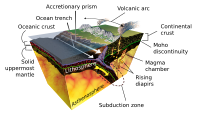
Effect of Fluid Viscosity on Earthquake Nucleation
Sign Up to like & getrecommendations! Published in 2020 at "Geophysical Research Letters"
DOI: 10.1029/2020gl087854
Abstract: Injection of fluids in geo‐reservoirs can reduce the effective stresses at depth, lubricating the nearby faults, promoting slip and, potentially, earthquakes. High‐viscous fluids are often used during hydraulic fracturing and production phases in geo‐reservoirs. Here,… read more here.
Keywords: viscosity earthquake; viscosity; earthquake nucleation; fluid ... See more keywords

Earthquake Nucleation Along Faults With Heterogeneous Weakening Rate
Sign Up to like & getrecommendations! Published in 2021 at "Geophysical Research Letters"
DOI: 10.1029/2021gl094901
Abstract: The transition from quasistatic slip growth to dynamic rupture propagation constitutes one possible scenario to describe earthquake nucleation. If this transition is rather well understood for homogeneous faults, how the friction properties of multiscale asperities… read more here.
Keywords: earthquake nucleation; weakening rate; nucleation; nucleation along ... See more keywords

Unstable Slip Pulses and Earthquake Nucleation as a Nonequilibrium First-Order Phase Transition.
Sign Up to like & getrecommendations! Published in 2018 at "Physical review letters"
DOI: 10.1103/physrevlett.121.234302
Abstract: The onset of rapid slip along initially quiescent frictional interfaces, the process of "earthquake nucleation," and dissipative spatiotemporal slippage dynamics play important roles in a broad range of physical systems. Here we first show that… read more here.
Keywords: slip; first order; slip pulses; earthquake nucleation ... See more keywords

Earthquake nucleation on rough faults
Sign Up to like & getrecommendations! Published in 2017 at "Geology"
DOI: 10.1130/g39181.1
Abstract: Earthquake nucleation is currently explained using rate and state stability analysis, which successfully models the behavior of laboratory simulated faults with constant thickness gouge layers. However, roughness is widely observed on natural faults and its… read more here.
Keywords: slip; rough faults; earthquake nucleation; nucleation rough ... See more keywords